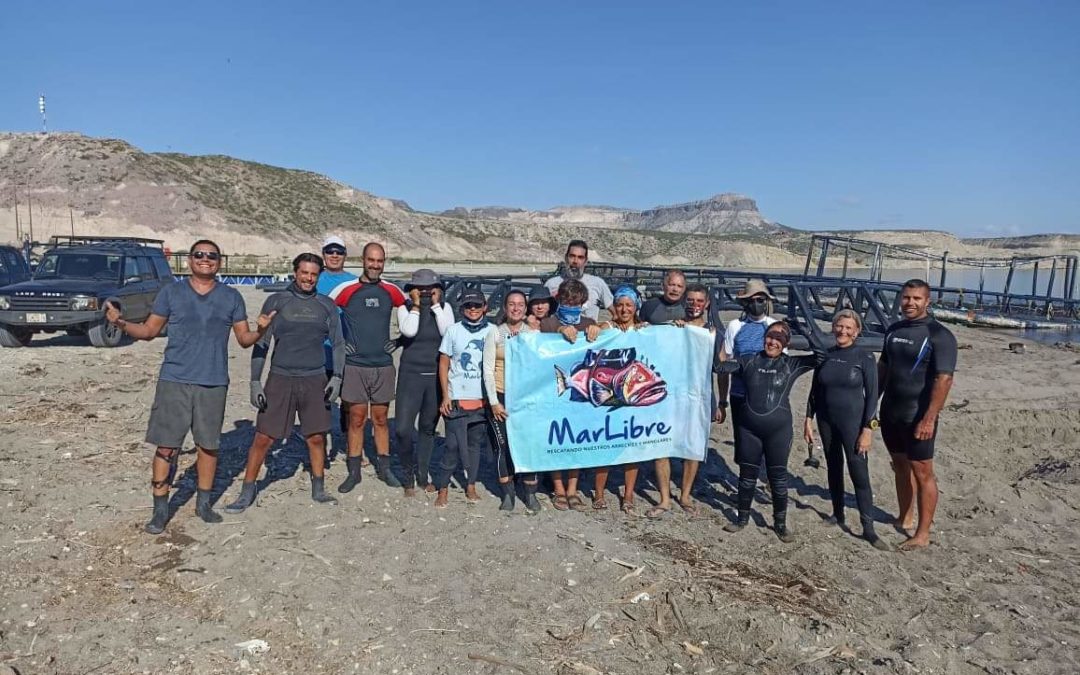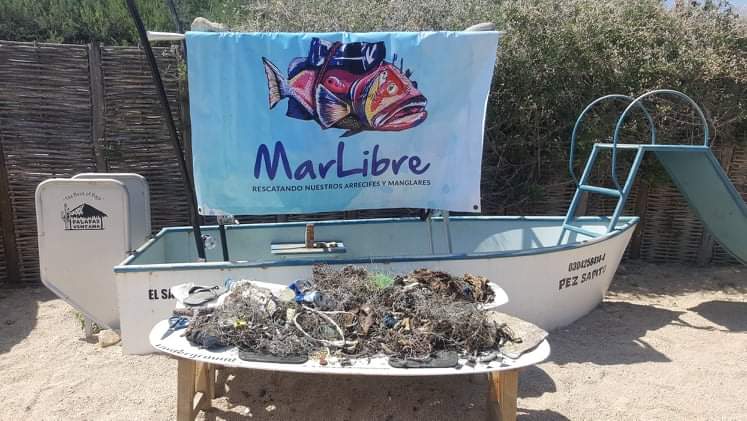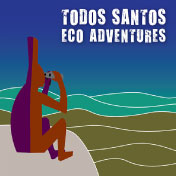
Mar Libre
 Like many of the best things in life, Mar Libre was born over drinks by friends kvetching about the state of things. “When you get biologists together, the conversation invariably veers to how bad things are in the natural world” says Pablo Ahuja, one of the founders of Mar Libre. “On this particular night we were all complaining about how we couldn’t enjoy diving at San Rafaelito in the Sea of Cortez anymore because every time we went, we’d have to spend all of our time and air picking fishing line off the coral. This is painstaking work that must be done very carefully so the coral doesn’t get damaged.” Pablo continues, “Right then and there we decided that instead of cleaning up areas incidentally when we were out diving, we’d start diving with the purposeful intent of cleaning these natural areas.”
Like many of the best things in life, Mar Libre was born over drinks by friends kvetching about the state of things. “When you get biologists together, the conversation invariably veers to how bad things are in the natural world” says Pablo Ahuja, one of the founders of Mar Libre. “On this particular night we were all complaining about how we couldn’t enjoy diving at San Rafaelito in the Sea of Cortez anymore because every time we went, we’d have to spend all of our time and air picking fishing line off the coral. This is painstaking work that must be done very carefully so the coral doesn’t get damaged.” Pablo continues, “Right then and there we decided that instead of cleaning up areas incidentally when we were out diving, we’d start diving with the purposeful intent of cleaning these natural areas.”
Pablo and his friends decided to set a date right then and there. “On the night of July 3, 2015 we posted on Facebook about a clean-up dive for July 21, 2015, and by the next morning we had over 20 divers and dive companies saying they wanted to participate. By the time July 21 rolled around, there were 8 boats and 70 people volunteering to help. That day we cleaned the reef not only San Rafaelito, but La Gaviota as well.” That was a little over 6 years ago and Mar Libre has done a monthly reef or mangrove clean up dive every month since then. Says Pablo, “There are so many rents that we pay on a monthly basis like housing, electricity, and telephone, so we decided that we would also pay our monthly rent to Mother Nature.”
The Mar Libre crew understood from the beginning that conservation without education is not productive or sustainable, so in October 2015 they started going into the schools to educate students and staff on the issues, using the photos and data they had from the July, August, and September clean up dives. Pablo, a marine biologist with a background in science education, lead the charge. “The school directors in Baja California Sur have been great to work with. They will give us 45 minutes per classroom to discuss the problems and the solutions. Very often after a visit an entire school will go on a cleanup. Cleaning a mangrove or reef really changes their views. They simply cannot believe the amount of trash that there is, and they realize that only they can really be the agents of change. So far we’ve engaged with over 24,000 students in BCS.”
Just how much trash is there? Recalls Pablo, “We did a cleanup at El Magote in La Paz in March 2021 with 200 volunteers and 8 boats. We took that trash to the La Paz dump which has a scale. That is how we learned that we had collected 8.4 tons of trash on just that one day. We estimate that we’ve cleaned over 140 tons of trash from the reefs and mangroves since we started the project in 2015.” Some of the things that they find in a mangrove that has never been cleaned might seem surprising to the uninitiated. Recounts Pablo, “We’ve found fax machines, washing machines, electrodes, 50 year-old mason jars. We pulled 4 porcelain toilets out of one mangrove. We figured folks had gone camping and were just looking for a little privacy. It’s fun to date stuff that comes out of the cleanups. There is a brand of beer called Carta Blanca that used to make its bottles with a little indentation on the side. The idea was to use one bottle to take the cap off the next. They stopped making those bottles in 1970 so when we find them we know that trash is at least 50 years fold.”
Pablo takes the long view on his quest to clean the reefs and mangroves of Baja California Sur. “When we go to a new spot, literally no one in human history has ever cleaned that place before. It can seem overwhelming at the first cleaning, but subsequent visits are encouraging. Pargo Villa Reef near Isla Ceralvo is a good example. In September 2015 we cleaned that reef for the first time and took out 100 kilos of fishing line alone. In September of 2016 we cleaned again and took out 10 kilos of fishing line, and we think this was mainly because we didn’t get it all the first time. In September 2017 we cleaned again and there was only one kilo of fishing line. And with education, 100 kilos of fishing line will never build up in this spot again.”
Mar Libre exists only in the hearts and minds of the kayakers, surfers, divers, sailors, biologists, students and other ocean lovers who volunteer their time, energy and resources to cleaning our local reefs and mangroves. There is no office, no staff, no NGO status, no budget, no funds. Pablo’s goal is to wipe out even that reality. “We want to clean and educate ourselves out of existence.” But that moment is not yet at hand and much work remains to be done. Everyone is invited to join the Mar Libre movement and participate in the monthly reef and mangrove cleanups. Invite your friends, your family, your school group, your office mates to join you!
Ways to be in touch:
Facebook: https://www.facebook.com/Mar-Libre-1427941930867030 Email: Telephone: 612 154 9859
